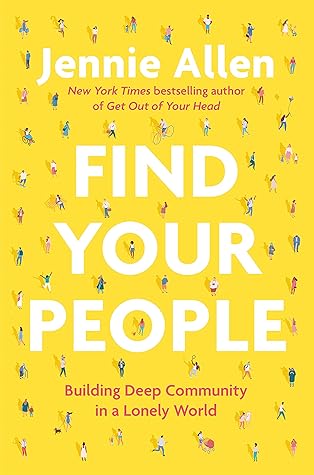More on this book
Community
Kindle Notes & Highlights
by
Jennie Allen
Read between
July 18 - August 11, 2022
Jesus said that the person who has been forgiven much, loves much.[3] So, too, the things that sent us into hiding are the very tools God redeems to pull us out of hiding and so that, in love, we can go pull other people out of hiding.
Hurting people hurt others. But equally true is that only forgiven people can truly forgive.
We have to become friends who call each other out of hiding. “If we walk in the light, as he is in the light, we have fellowship with one another, and the blood of Jesus, his Son, purifies us from all sin.”[4] We come into the light. We risk transparency. And we create a safe space for others to do the same.
Your whole village doesn’t need to know everything. Only those committed to walking with you through your everyday life and deepest struggles qualify here.
Instead of ordering something on Amazon, try to borrow it from your neighbor instead. Move your firepit or picnic table into the front yard. Talk to people as they walk by and invite them to join you! Invite your neighbors to watch a movie on a projector in your front yard. Ask your safe people to meet up for coffee and prepare them that you want to go deeper. Answer honestly the next time someone asks, “How are you doing?” Call a friend instead of texting her. Even if it’s not a serious call, it gets you talking a little bit more. Ask your friends about the highs and lows of their week. Tell
...more
Brittany Bresnan liked this
“I know this may be a little awkward, but I am new to this level of honesty and being vulnerable. Can you please be honest with me if I share too much too quickly? Your honesty will help me know how to share and grow in this.”
Sometimes people don’t know what to do with difficulty. Give them grace and maybe slow down a little in how much you’re sharing. But also don’t assume you’ve overwhelmed them. Maybe they weren’t sure how to respond but are incredibly grateful for how deep you just went.
“Do all things without grumbling or disputing, that you may be blameless and innocent, children of God without blemish in the midst of a crooked and twisted generation.”[6] The apostle Paul, who penned those words, must have known that, while complaining feels good in the short term, it rarely solves the problem we’re complaining about.
Complaining is usually centered on others rather than acknowledging our own role in the situation. Vulnerability, in comparison, requires humility and an eagerness to grow. Being truly (and appropriately) vulnerable begins with a heart that desires change, a heart that wants to break the bondage of a negative thought pattern and instead seek and walk in truth. Complaining seeks relief. Vulnerability seeks transformation and connection.
Choose friends who have the potential to make you better. Then allow them to do just that.
Bacon, coffee, dreams, making each other better, believing for each other what is difficult to believe for ourselves, reminding each other of Jesus and grace and heaven—this is the good stuff of friendships that will last.
Our sin is worse than we imagine. And the grace of God is bigger and better than we can imagine.
When one person shares a concern, another responds, “Okay, I hear you. Now, let’s go hear from God.” We don’t stop with venting. We don’t stop with fix-it worldly wisdom. We take all of it together to God and His Word. You and I need friends who, instead of trying to fix us, help us to fix our eyes more firmly on Jesus.
Brittany Bresnan liked this
in the underground church told me, “We have a saying in the Middle East that you don’t know someone until you’ve gone on a trip with them and you’ve eaten with them. It’s so true. The camaraderie.
“True discipleship doesn’t happen out there; it happens in a home. True discipleship isn’t something you do once a week. It’s what you do every day because that’s when you get to know people.
Discipleship is inconvenient, uncomfortable, and very messy.”


